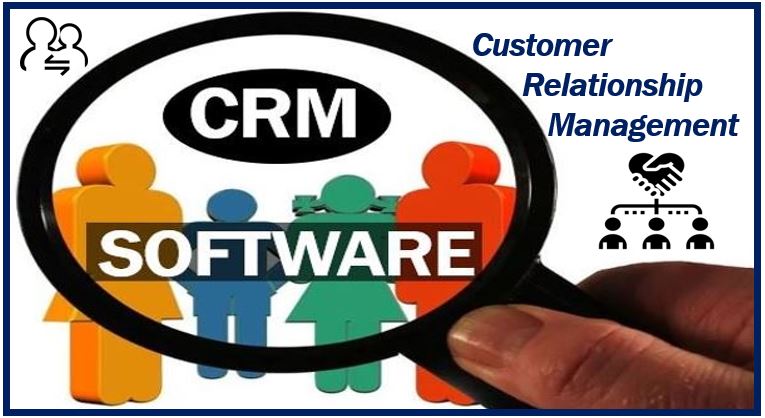CRM has played a pivotal role over the years helping businesses better organize and manage their relationships with the customers. The increasing adoption of CRM software tools with advanced technologies such as AI and IoT are on the rise of growth opportunities in the market.

Well, the technology has been evolving fast, and the customer’s expectation for a better experience is getting higher every passing day. It is also important for businesses to be cognizant of the future of CRM so that you can be at the forefront of innovation and ahead of the competition.
In this blog, we’ll talk about the future of CRM and what to watch in 2020.
CRM: Prevailing Landscape and Market Potential
When we talk about the adoption of CRM, it is now at the heart of every growing business across verticals. According to Grandview Research, the global CRM market size was USD 40.2 billion in 2019 and is expected to grow at a CAGR of 14.2% from 2020 to 2027.
The use of CRM software on mobile devices has increased significantly due to the adoption of cloud-based CRM solutions as it allows easy accessibility from anywhere. Forester data revealed that 50% of teams improved their productivity by using mobile CRM.
CRM: What to Watch in 2020
1. Adoption of Artificial Intelligence and Automation
Advanced technologies such as AI and automation will be leveraged heavily for augmenting CRM outcomes. According to Statista report, businesses can gain an additional $394 billion in revenue with Artificial Intelligence adoption in CRM activities by 2021in the United States.
AI-driven CRMs will have the following:
- Virtual assistants and bots
- Ability to learn from past decisions and historical patterns
- Intelligent segmentation
- Better customer engagement with image recognition and sentiment analysis
- Algorithm-based price-optimization for more sales
AI and automation will empower sellers with the right insights, and help optimizing campaigns, product configurations, and pricing.
2. Self-Service Via CRM
CRMs are expected to have more self-service capabilities in the coming days. Currently, there’s just one-way communication, but in the future, it’ll be more collaborative between the brand and the customer.
B2B buyers prefer to self-educate by accessing self-service content and processes to agent-assisted channels. Customer self-service allows customers to perform various standard tasks without the assistance of support staff.
In order to provide this added convenience to the customers, companies are adopting self-service technologies in CRM. This will help reduce customer service costs and ensure a better customer experience.
3. Unification of Sales and Marketing around Business Objectives
It’s the business that suffers most due to internal conflicts between sales and marketing. The future CRM systems will empower businesses to align sales and marketing functions even more closely around common goals and definitions. This will help:
- Increase customer retention
- Reduce churn
- Shorten the sales cycle
- Increase sales
- Decrease customer acquisition cost
Future CRMs powered by the latest technologies will empower marketing to generate attention and provide extensive content, wherein the sales will become the subject matter experts.
4. Unified CRM
NewVoiceMedia research indicates that every year USD 62 billion is lost due to poor customer service in the U.S. alone. According to the HuffPost report, 91% of customers who are unhappy leave the brand without complaining.
In an attempt to fix this issue, we are going to see continued consolidation of departmental CRMs and the evolution of unified CRM. Instead of siloed departmental CRM systems that offer disjointed customer experience, unified customer relationship management systems help deliver tailored role-based experiences.
Unified CRMs are expected to have the following capabilities:
- Drag-and-drop UI
- Opportunity management
- Strong marketing automation features
- Project management features
- Custom data fields
- Detailed contact and company profiles
- Customizable dashboards
5. Mobile & Social CRM
The adaptation of mobile and social CRM is going to be more in 2020 and beyond. Future CRM systems will be mostly cloud-based and deliver the full experience on various mobile devices such as smartphones, tablets, etc. without compromising the security.
With the pervasiveness of social media, social CRM will have extensive adoption in the future. Integrations with various social channels such as Twitter, Facebook, and LinkedIn are common, while the future CRMs will integrate capabilities to connect with more such platforms and networks.
6. IoT Integration
According to McKinsey, the IoT-connected devices will grow in number to 43 billion by 2023, and this is going to bring the next level of maturity to CRM. Future CRMs will make sense of the historical enterprise data, connect it with real-time data from different internet of things, and generate insights to take action.
This treasure trove of data on customer behavior, location, priorities, and patterns bring excellent opportunities for Sales, Service or Marketing to transform the customer experience, and create a new revenue stream for businesses.
With IoT integrated CRMs business will be able to perform the following:
- Offer demand-based pricing
- Customized marketing promotions
- Real-time analytics
- Zero-complaint customer service
- Boost customer retention
Conclusion
The CRM software in the market is going to grow bigger in the coming years. In addition to the aforementioned trends, there are advanced CRM software tools in the market that organisations are investing to aid growth with advanced Voice and conversational UI, Analytics, AR & VR, and Hyperpersonalization features in 2020 and beyond.
Interesting Related Article: “Custom CRM systems are taking the lead“

